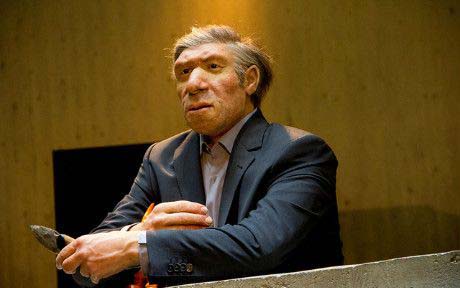Dealing with Stress & Anxiety: Tips from Our Inner Neanderthal, 1

Dealing with stress and anxiety is a crucial topic in our time: do evolutionary and archetypal psychology have anything helpful to say about it?

Your Neanderthal consultant
Well, it turns out that they do. Learning to acknowledge our anxiety, and to give it its appropriate due, is an important exercise in self-acceptance, as a part of case studies. It amounts to acceptance of part of what Jung would call our inner “2,000,000 year old person.”
Anxiety has evolved as part of our psyche for some pretty good reasons. Just what exactly does it do for us?
1. You Need Your Anxiety
Much as many modern people feel that their lives are riddled with useless anxiety, the fact is, that we do genuinely need our anxiety to survive. As psychiatrist Anthony Stevens puts it:
Psychiatric emphasis on anxiety as a classifiable “illness” has given rise to the erroneous belief, current through most of [the last 100 years], that anxiety is “neurotic” and that no well-adjusted person should expect to suffer from it. In fact, the capacity to experience anxiety is indispensible to survival…. An animal without fear is a dead animal. [italics mine]
Evolution has developed anxiety as a means of helping organisms to survive and thrive. In fact, anxiety is a special form of alertness that helps humans and most of our animal kin to register when there are changes in our environment, so that we can respond appropriately to any type of emergency that might arise.
In fact, evolutionary psychologists can demonstrate how irrational fears, or phobias, are linked to appropriately adaptive responses that have somehow been blown out of proportion.

2. Many Anxiety Disorders are Out-of-Order Forms of Adaptive Strategies
Depth case studiess well know that, when anxiety gets out of whack, it doesn’t help us to respond to situations properly. Yet, even then, we can see how phobias get their start from an appropriate response that has a basis that facilitates our survival:
We need to deal with stress and anxiety in an appropriate and complete way, that accords with /a-midlife-transition. To do that requires coming to terms with parts of the psyche that are rooted in our evolution, and fixed in responses to the world that date right back to our early human and proto-human ancestors. In speaking of contemporary research into anxiety and panic, Dr. Stevens tells us, “[All researchers] agree that the physiological and psychological components of anxiety, fear and panic galvanize an organism to adaptive action.”
3. Personal & Archetypal Dimensions of Dealing with Stress & Anxiety
A key concern for therapy, then, is to understand how stress and anxiety in the individual have been distorted into forms that keep them from helping to “galvanize an organism [ourselves!] to adaptive action.” To understand that fully in the life of the individual means examining both the personal roots of their anxiety, and the ways that archetypal elements of the psyche come into play in that person’s particular situation, and understanding the role that all these factors play in our journey to wholeness. We’ll be opening this up more in Part 2 of this post.
Brian Collinson, Registered Psychotherapist & Jungian Analyst
[cta]
